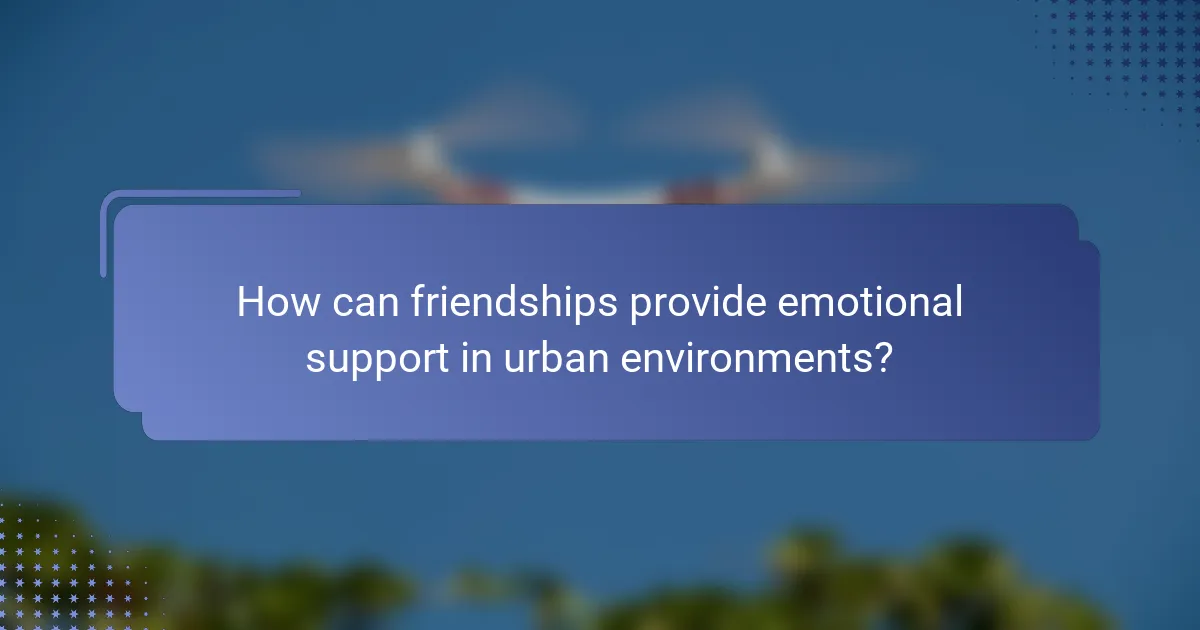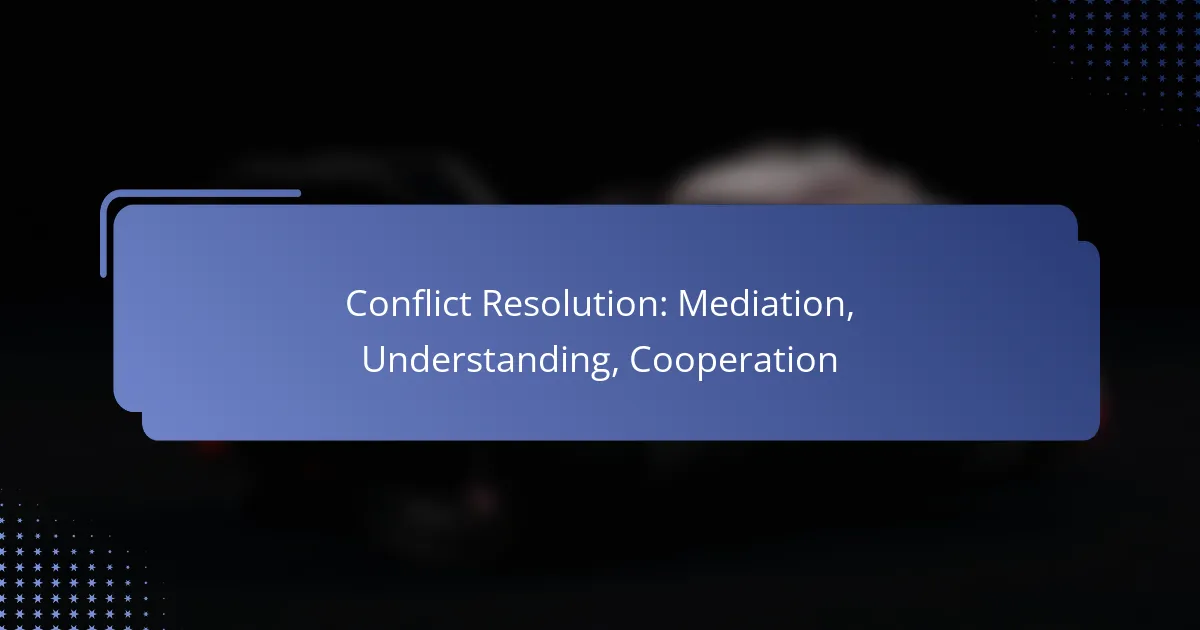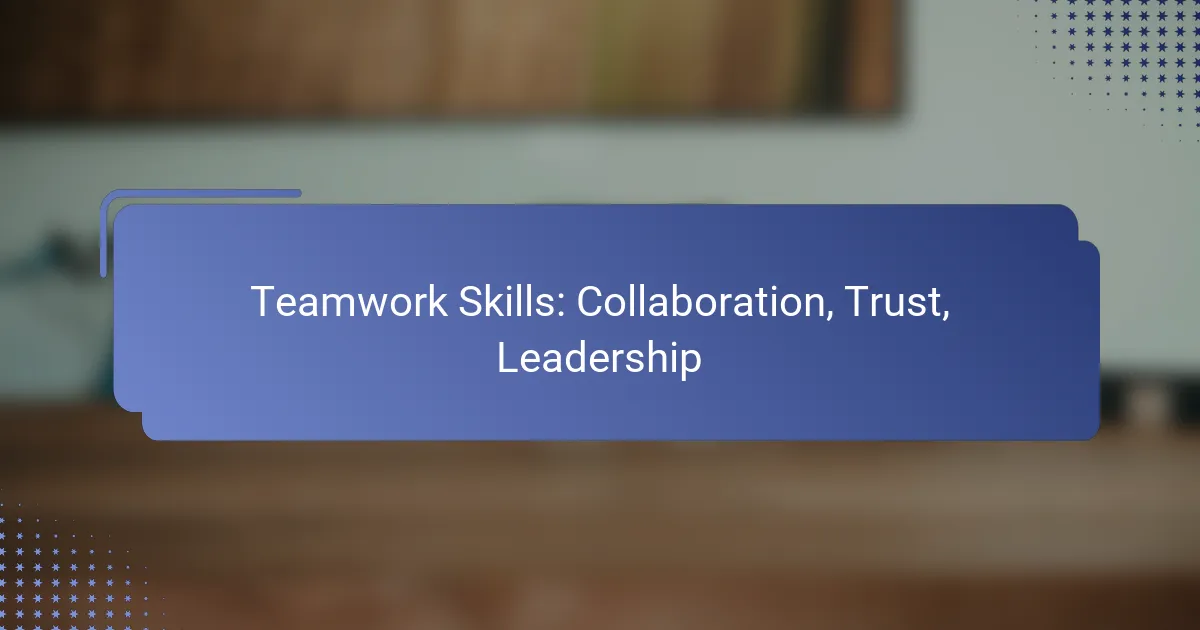Friendships play a crucial role in providing emotional support and fostering a sense of belonging, particularly in urban environments where isolation can be common. By engaging in activities that promote connection, such as joining local clubs or attending community events, individuals can build meaningful relationships that enhance both personal and professional networks.

How can friendships provide emotional support in urban environments?
Friendships in urban environments offer essential emotional support by creating a network of individuals who understand the unique challenges of city life. These connections can alleviate feelings of isolation and provide a sense of belonging amidst the hustle and bustle of urban living.
Increased social interactions
Urban settings often present opportunities for frequent social interactions, which can enhance emotional well-being. Engaging with friends in various activities, such as dining out or attending events, fosters a sense of community and reduces stress. Regular socialization can lead to improved mental health, making it crucial to prioritize these connections.
Consider scheduling weekly meet-ups or joining local clubs to maintain these interactions. Even casual gatherings can strengthen bonds and provide a support system during challenging times.
Access to diverse perspectives
Friendships in cities often involve individuals from varied backgrounds, providing access to diverse perspectives. This diversity can enrich conversations and help friends navigate complex urban issues, such as housing, transportation, and social dynamics. Exposure to different viewpoints can foster empathy and understanding, which are vital for emotional support.
Engaging in discussions about personal experiences or cultural practices can deepen friendships and enhance emotional resilience. Embrace these differences as opportunities for growth and connection.
Shared experiences in city life
Living in an urban environment comes with unique challenges, such as high living costs and fast-paced lifestyles. Friends who share these experiences can offer relatable support and practical advice. Whether it’s coping with long commutes or managing financial pressures, having someone to share these burdens can significantly lighten the emotional load.
Consider forming small support groups with friends to discuss common challenges and brainstorm solutions. This collaborative approach can foster a sense of solidarity and make navigating city life more manageable.

What are effective networking strategies for building friendships?
Effective networking strategies for building friendships include engaging in activities that foster connections, such as joining local clubs, utilizing social media, and attending community events. These approaches create opportunities to meet new people and establish meaningful relationships.
Joining local clubs and organizations
Joining local clubs and organizations is a practical way to meet individuals with similar interests. Look for groups that align with your hobbies, such as book clubs, sports teams, or volunteer organizations. These settings encourage interaction and provide a natural environment for friendship development.
Consider attending a few meetings before committing to a club. This allows you to gauge the group’s dynamics and see if it feels like a good fit. Many organizations also host social events, which can further enhance your networking opportunities.
Utilizing social media platforms
Social media platforms can be powerful tools for building friendships, especially in today’s digital age. Use platforms like Facebook, Instagram, or Meetup to connect with local groups or individuals who share your interests. Engaging with content and participating in discussions can help you establish connections.
Be mindful of how you present yourself online. Authenticity is key; share your interests and experiences genuinely to attract like-minded individuals. Additionally, consider joining specific interest groups on these platforms to facilitate deeper connections.
Attending community events
Attending community events is another effective strategy for networking and building friendships. Look for local festivals, workshops, or public gatherings that interest you. These events often provide a relaxed atmosphere conducive to meeting new people.
When attending, approach conversations with an open mind and a friendly attitude. Don’t hesitate to introduce yourself and ask questions about others’ interests. Following up with new acquaintances after the event can help solidify these budding friendships.

How do friendships enhance professional networking?
Friendships significantly enhance professional networking by creating a foundation of trust and support that can lead to new opportunities. Strong personal connections often translate into professional referrals, collaborations, and mentorship, which are essential for career growth.
Referrals and job opportunities
Friendships can lead to valuable referrals and job opportunities, as friends are often aware of each other’s skills and strengths. When a position opens up, a friend may recommend you, increasing your chances of being noticed by potential employers.
To leverage this, maintain regular communication with your professional friends and express your career aspirations. This way, they can keep you in mind for openings that align with your goals.
Collaborative projects and partnerships
Collaborative projects often arise from friendships, allowing individuals to combine their strengths and resources. These partnerships can lead to innovative solutions and increased visibility within your industry.
Consider reaching out to friends for joint ventures or projects that align with your professional interests. This not only enhances your portfolio but also strengthens your network through shared experiences and outcomes.
Mentorship and guidance
Friendships can provide mentorship and guidance, as friends often share insights and experiences that can help each other navigate career challenges. A friend with more experience in a particular field can offer advice that is both practical and relevant.
Seek out friends who have expertise in areas you wish to explore. Regularly engage in discussions about your professional development, and be open to receiving constructive feedback to enhance your skills and knowledge.

What role do friendships play in mental health?
Friendships play a crucial role in mental health by providing emotional support, reducing feelings of isolation, and enhancing overall well-being. Strong social connections can lead to lower levels of stress and anxiety, improved self-esteem, and a greater ability to navigate life’s challenges.
Reduction of stress and anxiety
Friendships help reduce stress and anxiety by offering a safe space for individuals to express their feelings and concerns. Engaging in social activities with friends can distract from daily pressures and provide a sense of belonging.
Consider scheduling regular meet-ups or virtual hangouts to maintain these connections. Activities like sharing a meal, going for a walk, or participating in a hobby together can significantly lower stress levels.
Improved self-esteem and confidence
Having supportive friends can boost self-esteem and confidence by providing positive reinforcement and validation. Friends often celebrate each other’s achievements, which fosters a sense of accomplishment and worth.
To enhance self-esteem, focus on surrounding yourself with friends who uplift you. Avoid relationships that are consistently negative or critical, as they can undermine your confidence over time.
Support during life transitions
Friendships offer essential support during significant life transitions, such as moving to a new city, starting a new job, or experiencing personal loss. Friends can provide guidance, share experiences, and help you navigate these changes more smoothly.
When facing a transition, reach out to friends for advice or simply to talk. Their perspectives can provide valuable insights and emotional comfort, making the process feel less daunting.

How can friendships be maintained over long distances?
Maintaining friendships over long distances requires consistent communication and shared experiences. Utilizing technology and planning visits can help bridge the gap created by physical separation.
Regular video calls and chats
Video calls and chats are essential tools for staying connected with friends who live far away. Scheduling regular sessions, such as weekly or bi-weekly calls, can create a routine that strengthens your bond.
Consider using platforms like Zoom, Skype, or FaceTime, which offer user-friendly interfaces. Aim for calls that last around 30 minutes to an hour, allowing for meaningful conversations without feeling overwhelming.
Planning visits and trips
Planning visits can significantly enhance long-distance friendships. Setting a goal to meet at least once a year can provide something to look forward to and help maintain the connection.
When planning a visit, consider alternating locations to share travel costs and experiences. Look for budget-friendly options, such as staying with each other or exploring local attractions that don’t require expensive tickets.
Engaging in shared online activities
Participating in shared online activities can keep friendships lively and engaging. This could include playing video games together, watching movies simultaneously, or even taking online classes.
Choose activities that both friends enjoy, and set specific times to participate together. This not only fosters connection but also creates new memories that can be cherished despite the distance.



